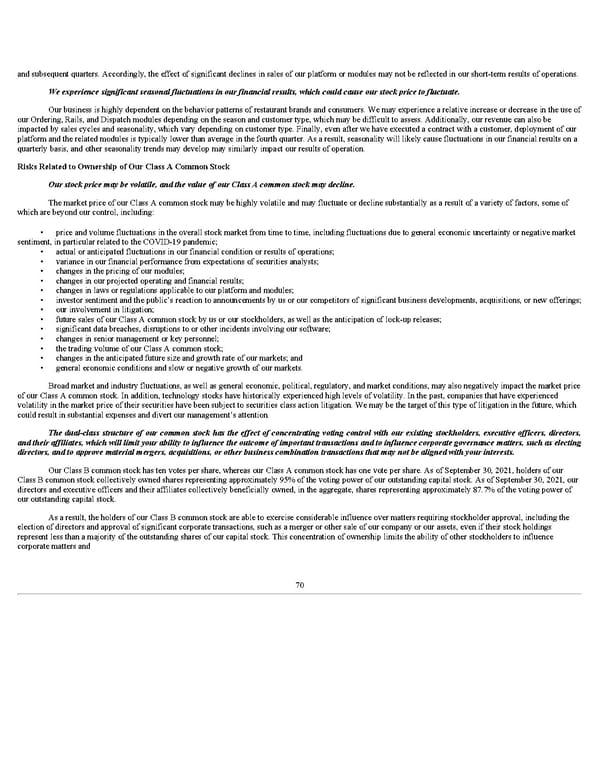and subsequent quarters. Accordingly, the effect of significant declines in sales of our platform or modules may not be reflected in our short-term results of operations. We experience significant seasonal fluctuations in our financial results, which could cause our stock price to fluctuate. Our business is highly dependent on the behavior patterns of restaurant brands and consumers. We may experience a relative increase or decrease in the use of our Ordering, Rails, and Dispatch modules depending on the season and customer type, which may be difficult to assess. Additionally, our revenue can also be impacted by sales cycles and seasonality, which vary depending on customer type. Finally, even after we have executed a contract with a customer, deployment of our platform and the related modules is typically lower than average in the fourth quarter. As a result, seasonality will likely cause fluctuations in our financial results on a quarterly basis, and other seasonality trends may develop may similarly impact our results of operation. Risks Related to Ownership of Our Class A Common Stock Our stock price may be volatile, and the value of our Class A common stock may decline. The market price of our Class A common stock may be highly volatile and may fluctuate or decline substantially as a result of a variety of factors, some of which are beyond our control, including: • price and volume fluctuations in the overall stock market from time to time, including fluctuations due to general economic uncertainty or negative market sentiment, in particular related to the COVID-19 pandemic; • actual or anticipated fluctuations in our financial condition or results of operations; • variance in our financial performance from expectations of securities analysts; • changes in the pricing of our modules; • changes in our projected operating and financial results; • changes in laws or regulations applicable to our platform and modules; • investor sentiment and the public’s reaction to announcements by us or our competitors of significant business developments, acquisitions, or new offerings; • our involvement in litigation; • future sales of our Class A common stock by us or our stockholders, as well as the anticipation of lock-up releases; • significant data breaches, disruptions to or other incidents involving our software; • changes in senior management or key personnel; • the trading volume of our Class A common stock; • changes in the anticipated future size and growth rate of our markets; and • general economic conditions and slow or negative growth of our markets. Broad market and industry fluctuations, as well as general economic, political, regulatory, and market conditions, may also negatively impact the market price of our Class A common stock. In addition, technology stocks have historically experienced high levels of volatility. In the past, companies that have experienced volatility in the market price of their securities have been subject to securities class action litigation. We may be the target of this type of litigation in the future, which could result in substantial expenses and divert our management’s attention. The dual-class structure of our common stock has the effect of concentrating voting control with our existing stockholders, executive officers, directors, and their affiliates, which will limit your ability to influence the outcome of important transactions and to influence corporate governance matters, such as electing directors, and to approve material mergers, acquisitions, or other business combination transactions that may not be aligned with your interests. Our Class B common stock has ten votes per share, whereas our Class A common stock has one vote per share. As of September 30, 2021, holders of our Class B common stock collectively owned shares representing approximately 95% of the voting power of our outstanding capital stock. As of September 30, 2021, our directors and executive officers and their affiliates collectively beneficially owned, in the aggregate, shares representing approximately 87.7% of the voting power of our outstanding capital stock. As a result, the holders of our Class B common stock are able to exercise considerable influence over matters requiring stockholder approval, including the election of directors and approval of significant corporate transactions, such as a merger or other sale of our company or our assets, even if their stock holdings represent less than a majority of the outstanding shares of our capital stock. This concentration of ownership limits the ability of other stockholders to influence corporate matters and 70
 Q3 2021 10Q Page 75 Page 77
Q3 2021 10Q Page 75 Page 77